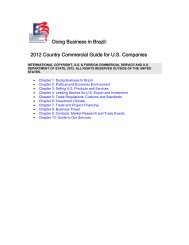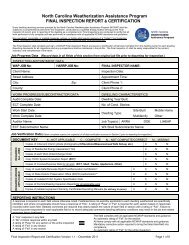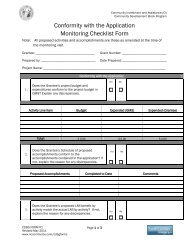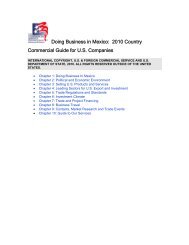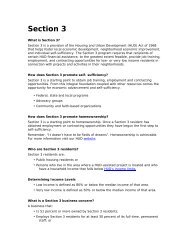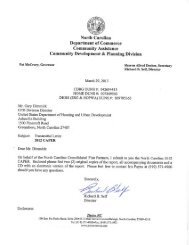Doing Business In (Insert Country Name Here) - Department of ...
Doing Business In (Insert Country Name Here) - Department of ...
Doing Business In (Insert Country Name Here) - Department of ...
Create successful ePaper yourself
Turn your PDF publications into a flip-book with our unique Google optimized e-Paper software.
Comparative advertising, subject to certain conditions, is defined as "advertising whichexplicitly or by implication identifies a competitor or goods or services by a competitor."Member States can, and in some cases have, restricted misleading or comparativeadvertising.The EU’s Audiovisual Media Services Directive lays down legislation on broadcastingactivities allowed within the EU. From 2009 the rules allow for US-style productplacement on television and the three-hour/day maximum <strong>of</strong> advertising will be lifted.However, a 12-minute/hour maximum will remain. Child programming will be subject toa code <strong>of</strong> conduct that will include a limit <strong>of</strong> junk food advertising to children.Following the adoption <strong>of</strong> the 1999 Council Directive on the Sale <strong>of</strong> Consumer Goodsand Associated Guarantees, product specifications, as laid down in advertising, are nowconsidered as legally binding on the seller. (For additional information on CouncilDirective 1999/44/EC on the Sale <strong>of</strong> Consumer Goods and Associated Guarantees, seethe legal warranties and after-sales service section below.)The EU adopted Directive 2005/29/EC concerning fair business practices in a furtherattempt to tighten up consumer protection rules. These rules outlaw several aggressiveor deceptive marketing practices such as pyramid schemes, "liquidation sales" when ashop is not closing down, and artificially high prices as the basis for discounts in additionto other potentially misleading advertising practices. Certain rules on advertising tochildren are also set out.Key Link:http://ec.europa.eu/comm/consumers/cons_int/safe_shop/fair_bus_pract/index_en.htmhttp://ec.europa.eu/avpolicy/reg/avms/index_en.htmMedicineThe advertising <strong>of</strong> medicinal products for human use is regulated by Council Directive2001/83/EC. Generally speaking, the advertising <strong>of</strong> medicinal products is forbidden ifmarket authorization has not yet been granted or if the product in question is aprescription drug. Mentioning therapeutic indications where self-medication is notsuitable is not permitted, nor is the distribution <strong>of</strong> free samples to the general public. Thetext <strong>of</strong> the advertisement should be compatible with the characteristics listed on theproduct label, and should encourage rational use <strong>of</strong> the product. The advertising <strong>of</strong>medicinal products destined for pr<strong>of</strong>essionals should contain essential characteristics <strong>of</strong>the product as well as its classification. <strong>In</strong>ducements to prescribe or supply a particularmedicinal product are prohibited and the supply <strong>of</strong> free samples is restricted.The Commission presented a new framework for information to patients on medicines in2008. The framework would allow industry to produce non-promotional information abouttheir medicines while complying with strictly defined rules and would be subject to aneffective system <strong>of</strong> control and quality assurance.Key Link:http://ec.europa.eu/enterprise/pharmaceuticals/patients/patients_key.htm2/18/2010 <strong>Country</strong> Commercial Guide for France 22INTERNATIONAL COPYRIGHT, U.S. & FOREIGN COMMERCIAL SERVICEAND U.S. DEPARTMENT OF STATE, © 2010. ALL RIGHTS RESERVED OUTSIDE OF THE UNITED STATES.




